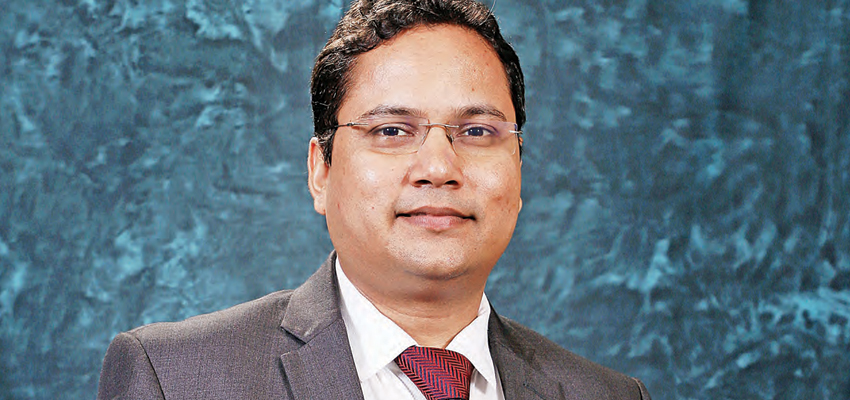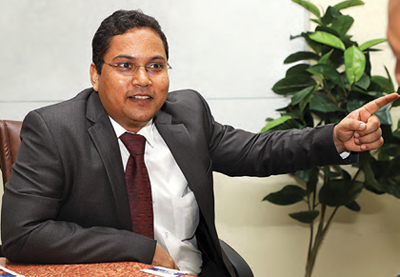Boundaries exist only in the mind

Passionate about building new ventures, Mahesh Dumbre, who is a Startup Advisor, Investor, and ex-Tata Group Executive, has added value in eight countries (including the US, the UK, China, India) and across ten industries (consumer, retail, food, e-commerce, agriculture, information technology, digital, telecom, education technology, financial services), over 17 years. As an intrapreneur, Mahesh has successfully developed and delivered a number of business plans with companies like Tata Sons, TCS, Tata Rallis, and many more adding a value of more than 80 million dollars (550 crore Indian rupees) over 17 years. He has also advised more than 500 global growth startups and done coaching for more than 5000 executives, entrepreneurs, learners, and investors. In an exclusive interview with Corporate Citizen, Mahesh Dumbre talks about his career journey, his long stint with Tata Group, intrapreneurship, startups, global outlook and experiences, life, and much more
Getting familiar with urbanism
I come from a small village, Otur, in rural Maharashtra, where I did my primary schooling. Thereon, I was fortunate to come to Pune for secondary schooling at Sir Parashurambhau (SP) College. My parents wanted me to be a doctor, but I was not that keen, so I joined the Vishwakarma Institute of Technology (VIT), Pune to study engineering. At VIT, I had a great learning experience. I got a chance to get familiar with the urban way of living, which was different from the small town rural background I was familiar with till then.
Many of my classmates from rural backgrounds could not afford a good education in Pune and that way I have been extremely lucky.
Opportunities to grow
Because I came from a village, I could not speak proper English in those days and hence got rejected from 44 job interviews. But I persisted, worked hard, got help, and finally got good job offers from both Tata and Mahindra group.
I joined Tata Consultancy Services (TCS), in 2003 as a Software Engineer-it was a great experience. They appreciated the work I did and gave me excellent opportunities. Given that I was able to add value, learn, contribute and solve problems, they sent me to the US twice to work with Nortel Networks, which was one of the largest vendors of telecom equipment in the world in those days. They even wanted me to go to Canada, but I couldn’t due to personal reasons.
Then TCS sent me to China to work with Chinese Foreign Exchange Trading System, which was a huge experience. If you work with a large company and if you are good then they take you to places, wherever they need your skills.
Learning comes to me naturally
Both my parents are teachers besides being farmers, so learning comes to me naturally. I just love to learn, teach, share, experiment, and coach. If you see my career graph, it is not straight I was learning and doing things where I could be useful. Besides, you want to know what is happening in the world, how technology is changing everything we do, how financial markets work, how companies operate, how they make decisions. Which companies grow and which companies fail. So, that curiosity was always there, as to how can you know more and how can you add more value.
That is how I went on to study Commodity Markets from Welingkar Institute in Mumbai. That course was extremely helpful. One of the gaps in our education system is that they don’t teach us how to manage money, how markets work, what sells, and what doesn’t sell. They don’t teach us how these complex structures of stock exchanges, commodity exchanges, depositories, currency markets (including crypto) work. I think this should be made a compulsory part of the syllabus for all the students.
"What is more important is how skillful and valuable you are going to be in this world either as a specialist or a generalist, so that the world can reward you accordingly. By and large, the world is fair in terms of rewarding you for your value add"

China-a life changing experience
When I went to China in 2009, it was a life-changing experience extremely intense, forward-looking, and execution-focused. I saw how the Chinese were progressing so fast and at scale, with so much rigour, execution focus, and huge ambition. So, later I went back to Hong Kong, to do my management studies at Hong Kong University, they are the number one in Asia. They have a special scheme, where if an alumnus donates, say, a million dollars to the university, the government will also invest a million dollars. Chinese have got global aspirations Hong Kong University has got a tie up with London Business School. It was another life changing experience. Now I can proudly say that I have got great association with valuable contacts in almost all cities and countries around the world with a network of more than 50,000 highly qualified executives, entrepreneurs and investors.
Corporate Citizen: India and China are seen as the two biggest markets and as you are into marketing and worked in China, what differences have you seen, as per market and marketing?
Mahesh Dumbre: Depending on the sector, the US is like 20 years ahead of India, and China depending on the sector, they are 10 to 20 years ahead of India. Chinese do everything at scale you see any industry in China, it is at least five times bigger than in India. We started liberalisation in the year 1991 and China started it in 1978, so they got some lead time there. In China, because it’s a one-party system, things move fast. For example, when I was staying in Shanghai, there I had seen an empty area and when I passed by the same area after two months, I was surprised to see a fully functioning bridge built there. Building the same bridge anywhere in India would have taken at least five to ten years. So, I found that in China decision-making is very fast, execution is very fast, the scale is huge. Chinese have made up their mind that they have to overtake the US. So, if you look at the size of the economy, India is around USD 2.7 trillion economy and China has already crossed the USD 12 trillion mark, they are six times bigger than us.
CC: You have stayed within Tata Group for over 16 years. How will you define yourself as staying with one company for so long?
I am extremely thankful and grateful to Tata Group because they gave me excellent opportunities. I got the opportunity to work with major TCS clients around the world. Later, I also had the opportunity to work with TCS CEOs’ office, on corporate strategic initiatives.
At Tata Group, they taught me processes, got great mentors, got exposure across functions, sectors, and geographies. After spending 10 amazing years in TCS, I joined Tata Sons, Tata Group Chairman’s office, at Bombay House. There I got to work with all Tata Group companies. Had the opportunity to work on a number of Tata Group-wide strategic initiatives while working for various Tata Group board members. I also lead a joint venture with a large American food company. Got to closely work with Tata Management Training Centre (TMTC), Tata Business Excellence Group, Tata Strategic Management Group and so many other esteemed institutions.
Yes, the Tata Group has given me a lot and I am a Tata man at heart.
"Being an entrepreneur is probably the best job in the world. You get to shape your own destiny, you are responsible, success or failure is all yours. It is not easy but definitely worth all the effort"
CC: Nowadays, the young generation doesn’t stick to one company for long and go job-hopping for better opportunities.
The world has changed earlier, people would stick to one company for a lifetime. If you see Chairman of the Tata Group, he has been there for over 30 years. It is an individual’s choice, some people want change and others want stability it depends on what your priorities and interests are. If you are getting a good opportunity in some other company and you want to go for it, then why not. But in general, if you want to do something meaningful, you have to spend at least 2-3 years in one company or a project. What is more important is how skilful and valuable you are going to be in this world either as a specialist or a generalist, so that the world can reward you accordingly. By and large, the world is fair in terms of rewarding you for your value add.
CC: With Tatas, you have successfully developed a number of business plans as an intrapreneur, so as an opportunity how would you look at intrapreneurship compared to entrepreneurship?
When you are an entrepreneur, you are on your own, starting from scratch, opening your bank account, spending your own money, building your own product or service and that’s what you have to do. But, when you are with a big brand like Tata, lots of things have happened and in the last 150 years, they have invested big time. People know you by your brand there is a brand recall and they can trust you. You have access to people, talent, brand, capital, processes, strategic inputs, and so on. If you are a Tata, people would want to join you. If you are a startup, you have worked hard to build your team. So, all that becomes much better organised if you are working with large companies.
At the same time, being an entrepreneur is probably the best job in the world. You get to shape your own destiny, you are responsible, success or failure is all yours. It is not easy but definitely worth all the effort. You have got one life and you have to make the best out of it. There is no one size fits all.
"If you are willing to learn, you are open minded, you can find your way around things, then things work out well"

CC: You have exposure of working in eight different countries like the UK, the US, China. Was it a big challenge getting used to different work cultures, languages and people?
It has been an extremely rewarding experience. Of course, there are cultural barriers, language barriers, and many other differences, but also you get exposed to diverse experiences, new learnings, synergies, expertise, and a lot more. For example, Americans are the best at management and innovation; Europeans are great at design; Chinese and Japanese are excellent at execution, while we Indians have got great amazing brains and jugaad attitude.
At TCS, we used to talk out, 24x7 global network delivery model when the world never sleeps and you can pick and choose the best talent and expertise around the world.
If you are willing to learn, you are open-minded, you can find your way around things, then things work out well, at least that has been my experience.
Fundamentally, we are all human beings who want to do good, contribute, and build a good life. Even if we speak different languages, look different, have different lifestyles, we are still more same than different.
The stories which my grandmother used to tell me are also the stories known to my good connects from the US, Europe, China, Japan, and other places.
CC: Are there big opportunities awaiting in the agriculture sector, given your work in the Agri solutions space?
You see, the agriculture sector is a must for the existence of human survival. While agriculture today has the biggest problems, which the government also wants to solve and the private companies also want to solve. Over 50 per cent of India’s population’s (more than 60-70 crore people) livelihood depends directly on agriculture, and most of them want a better life, better solutions, better products, better information, and whatnot. Every company in the Agri sector, they have big plans in terms of how much investment they will make, what kind of opportunities they see, what are the partnership possibilities around the world and within India. Agri tech companies such as Agrostar, Ninjakart, Plantix, etc as well as big corporates and multinationals such as Tata Rallis, Olam, Bayer, Monsanto, UPL are doing great work in this space.
CC: The Covid-19 crisis has brought in new opportunities for India, especially, masked opportunities for startups in India. Is the pandemic going to be a great leveller for the Indian economy, an opportunity in crisis for startups and some sectors?
Well as we all know, the situation created by the pandemic is not what any one of us wanted. It has badly affected so many livelihoods, jobs, and plans-many of us have our near and dear ones. At the same time, as American educator, Randy Pausch says, “We cannot change the cards we are dealt, just how we play the hand”, I am an eternally optimistic person and strongly believe in human potential. We have to find the solutions while problems will be always there.
Yes, there are opportunities in the startup space as always. An Ed Tech startup I am closely associated with has done extremely well during the pandemic. A robotics startup I have been helping with has got great plans for the future. Digital adoption is happening like never before. The conversational AI (artificial intelligence) startup we have looked at is going to achieve its growth targets five years in advance (in 2025 instead of 2030). In the last five years, I had opportunity to closely look at more than 500 global growth startups and many of them are doing well even during the pandemic.
CC: Which sectors do you think will be booming during and post-Covid pandemic and how will the future unfold for them?
As mentioned earlier, we are living amidst a huge change around us. During the pandemic, when many traditional sectors (travel, tourism, hospitality, airlines, real estate, etc) were struggling, the new age sectors such as e-commerce, online education, technology as well as pharma and healthcare have done well. A company like Reliance understood this well in advance and have transformed themselves from an energy business (petrochemicals) to a digital platforms business (Jio and Retail). The market capitalisation of Amazon, Google, Facebook, Tesla has gone up significantly in 2020 when pandemic played havoc around us. The same is true in the startup ecosystem where likes of Byju’s, Unacademy, Paytm, Flipkart by Walmart have done extremely well. Many of the megatrends such as digital adoption, Artificial Intelligence, power of data and analytics, premiumisation, health, and wellness are already creating great opportunities.